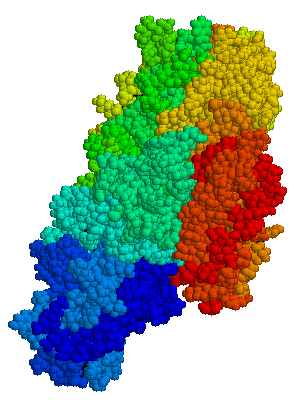Tissue transglutaminase
Tissue transglutaminase (tTG or TG2) is an enzyme that in humans is encoded by the TGM2 gene. tTG is a member of the transglutaminase family, which are enzymes that catalyze the formation of a covalent bond between a free amine group and the γ-carboxamid group of protein- or peptide-bound glutamine. This reaction results in cross-linking of proteins and the formation of a stable, covalently linked protein network. tTG is widely distributed in human tissues, with particularly high concentrations found in the liver, small intestine, and blood.
The enzyme plays a significant role in cellular processes including apoptosis (programmed cell death), cellular differentiation, and tissue repair. It is also involved in the pathogenesis of several diseases, most notably celiac disease. In celiac disease, tTG modifies gluten peptides, making them immunogenic to susceptible individuals. This modification triggers an autoimmune response, leading to the destruction of the intestinal villi and various gastrointestinal and extraintestinal symptoms.
Function[edit | edit source]
Tissue transglutaminase has multiple biological functions. It is involved in the stabilization of the extracellular matrix through the cross-linking of extracellular matrix proteins. This activity is crucial for tissue repair and the maintenance of tissue integrity. Additionally, tTG has a role in the regulation of apoptosis, acting as a core component in the cellular machinery that drives programmed cell death. Its involvement in apoptosis is thought to be a double-edged sword, contributing to both physiological processes such as tissue remodeling and pathological processes including neurodegenerative diseases and cancer.
Clinical Significance[edit | edit source]
The clinical significance of tTG is most prominently seen in its role in celiac disease. tTG modifies gluten peptides into a form that is recognized by the immune system of genetically predisposed individuals, leading to an autoimmune response. This response is characterized by the production of autoantibodies against tTG, which are used as a diagnostic marker for celiac disease. The detection of anti-tissue transglutaminase antibodies (anti-tTG) is a common and sensitive method for the diagnosis of celiac disease.
Beyond celiac disease, aberrant expression of tTG has been associated with various other pathological conditions, including inflammatory diseases, fibrosis, and cancer. In cancer, tTG expression is linked to increased tumor growth, metastasis, and drug resistance.
Genetic[edit | edit source]
The TGM2 gene, located on chromosome 20q11.2, encodes the tissue transglutaminase enzyme. Variations in this gene have been studied in the context of their potential association with susceptibility to celiac disease and other conditions. However, the relationship between TGM2 gene variants and disease susceptibility remains an area of ongoing research.
See Also[edit | edit source]
Translate: - East Asian
中文,
日本,
한국어,
South Asian
हिन्दी,
தமிழ்,
తెలుగు,
Urdu,
ಕನ್ನಡ,
Southeast Asian
Indonesian,
Vietnamese,
Thai,
မြန်မာဘာသာ,
বাংলা
European
español,
Deutsch,
français,
Greek,
português do Brasil,
polski,
română,
русский,
Nederlands,
norsk,
svenska,
suomi,
Italian
Middle Eastern & African
عربى,
Turkish,
Persian,
Hebrew,
Afrikaans,
isiZulu,
Kiswahili,
Other
Bulgarian,
Hungarian,
Czech,
Swedish,
മലയാളം,
मराठी,
ਪੰਜਾਬੀ,
ગુજરાતી,
Portuguese,
Ukrainian
Navigation: Wellness - Encyclopedia - Health topics - Disease Index - Drugs - World Directory - Gray's Anatomy - Keto diet - Recipes
Search WikiMD
Ad.Tired of being Overweight? Try W8MD's physician weight loss program.
Semaglutide (Ozempic / Wegovy and Tirzepatide (Mounjaro) available.
Advertise on WikiMD
WikiMD is not a substitute for professional medical advice. See full disclaimer.
Credits:Most images are courtesy of Wikimedia commons, and templates Wikipedia, licensed under CC BY SA or similar.
Contributors: Prab R. Tumpati, MD

